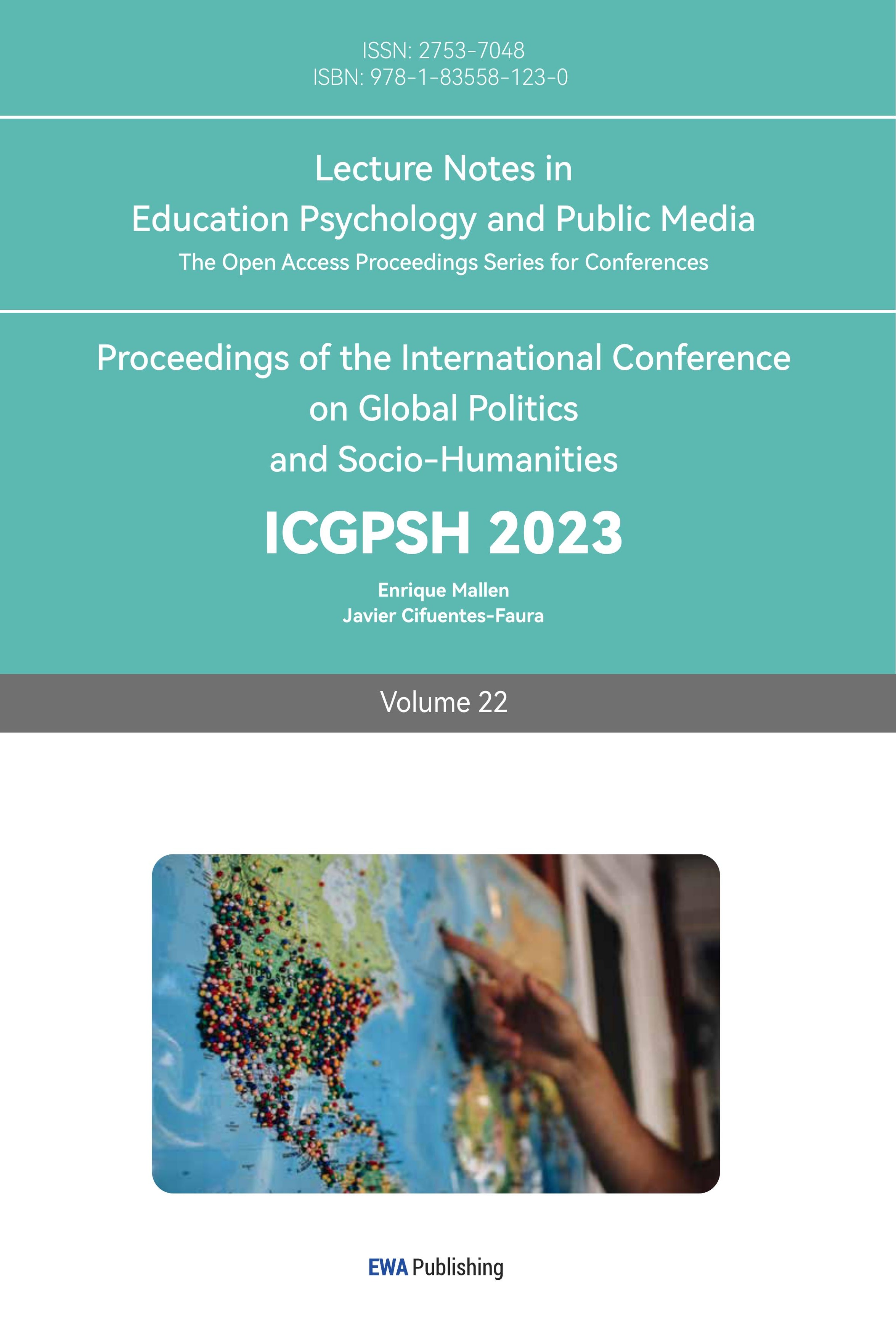References
[1]. Flavell, J. H. (1979). Metacognition and cognitive monitoring: a new area of cognitive-developmental inquiry. american psychologist, 34(10), 906-911.
[2]. The Core Literacy Research Group .(2016) Chinese students develop core literacy [J]. China Journal of Education, (10): 1-3.
[3]. Dong Qi.(1989) On Metacognition [J]. Journal of Beijing Normal University: Zhe She edition, (1): 68-74.
[4]. Hu, Xiaoli. (2020). Curriculum design and development based on mind mapping to develop elementary students’ metacognitive ability (Master’s thesis, Guangzhou University).
[5]. Wa, Yunyan. (2023) Promoting the use of mind maps in teaching[J]. Elementary Science, (6):97-99.
[6]. Sun Haolei. (2021) Research on the enhancement of elementary school students’ mathematical thinking ability by mind mapping [C]. Compilation of papers from South China Education Informatization Research Experience Exchange Conference (XI).
[7]. Chen Fei. (2021) Practical research on improving the metacognitive ability of high school students by using mind mapping [D]. Jiangxi Normal University.
[8]. Wu Y. (2021) Research on the application of mind map in the English reading teaching of art and sports college students [D]. Guangxi: Guangxi Normal University.
[9]. Cao Duanxi. (2018) Research on the cultivation strategies of metacognitive ability in high school chemistry Teaching [D]. Hubei: Central China Normal University.
[10]. Xu Mengfan. (2021) Cultivating Language Thinking Skills of Upper Elementary School Students with Mind maps[J]. Knowledge Base, (03):77-78.
[11]. Yang Guangping. (2021) Mind map, so that the language knowledge clear “number” Talk about the development of students using the mind map to sort out the ability of language knowledge [C]. //Proceedings of the Symposium on Curriculum Teaching and Management (Chongqing). 1-3.
[12]. Fei Chen. (2021) A practical study of using mind mapping to improve metacognitive ability of high school students [D]. Jiangxi Normal University.
[13]. Chen Jinhua. (2015) Teaching practice of improving the metacognitive ability of fifth grade students in mathematics [D]. Shanghai Normal University.
Cite this article
Ding,C. (2023). The Influences of Mind-Map on Cultivating Students' Metacognitive Capacity. Lecture Notes in Education Psychology and Public Media,22,130-139.
Data availability
The datasets used and/or analyzed during the current study will be available from the authors upon reasonable request.
Disclaimer/Publisher's Note
The statements, opinions and data contained in all publications are solely those of the individual author(s) and contributor(s) and not of EWA Publishing and/or the editor(s). EWA Publishing and/or the editor(s) disclaim responsibility for any injury to people or property resulting from any ideas, methods, instructions or products referred to in the content.
About volume
Volume title: Proceedings of the International Conference on Global Politics and Socio-Humanities
© 2024 by the author(s). Licensee EWA Publishing, Oxford, UK. This article is an open access article distributed under the terms and
conditions of the Creative Commons Attribution (CC BY) license. Authors who
publish this series agree to the following terms:
1. Authors retain copyright and grant the series right of first publication with the work simultaneously licensed under a Creative Commons
Attribution License that allows others to share the work with an acknowledgment of the work's authorship and initial publication in this
series.
2. Authors are able to enter into separate, additional contractual arrangements for the non-exclusive distribution of the series's published
version of the work (e.g., post it to an institutional repository or publish it in a book), with an acknowledgment of its initial
publication in this series.
3. Authors are permitted and encouraged to post their work online (e.g., in institutional repositories or on their website) prior to and
during the submission process, as it can lead to productive exchanges, as well as earlier and greater citation of published work (See
Open access policy for details).
References
[1]. Flavell, J. H. (1979). Metacognition and cognitive monitoring: a new area of cognitive-developmental inquiry. american psychologist, 34(10), 906-911.
[2]. The Core Literacy Research Group .(2016) Chinese students develop core literacy [J]. China Journal of Education, (10): 1-3.
[3]. Dong Qi.(1989) On Metacognition [J]. Journal of Beijing Normal University: Zhe She edition, (1): 68-74.
[4]. Hu, Xiaoli. (2020). Curriculum design and development based on mind mapping to develop elementary students’ metacognitive ability (Master’s thesis, Guangzhou University).
[5]. Wa, Yunyan. (2023) Promoting the use of mind maps in teaching[J]. Elementary Science, (6):97-99.
[6]. Sun Haolei. (2021) Research on the enhancement of elementary school students’ mathematical thinking ability by mind mapping [C]. Compilation of papers from South China Education Informatization Research Experience Exchange Conference (XI).
[7]. Chen Fei. (2021) Practical research on improving the metacognitive ability of high school students by using mind mapping [D]. Jiangxi Normal University.
[8]. Wu Y. (2021) Research on the application of mind map in the English reading teaching of art and sports college students [D]. Guangxi: Guangxi Normal University.
[9]. Cao Duanxi. (2018) Research on the cultivation strategies of metacognitive ability in high school chemistry Teaching [D]. Hubei: Central China Normal University.
[10]. Xu Mengfan. (2021) Cultivating Language Thinking Skills of Upper Elementary School Students with Mind maps[J]. Knowledge Base, (03):77-78.
[11]. Yang Guangping. (2021) Mind map, so that the language knowledge clear “number” Talk about the development of students using the mind map to sort out the ability of language knowledge [C]. //Proceedings of the Symposium on Curriculum Teaching and Management (Chongqing). 1-3.
[12]. Fei Chen. (2021) A practical study of using mind mapping to improve metacognitive ability of high school students [D]. Jiangxi Normal University.
[13]. Chen Jinhua. (2015) Teaching practice of improving the metacognitive ability of fifth grade students in mathematics [D]. Shanghai Normal University.









